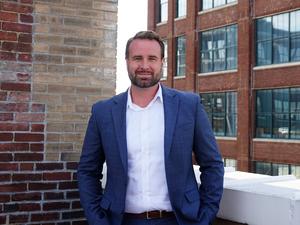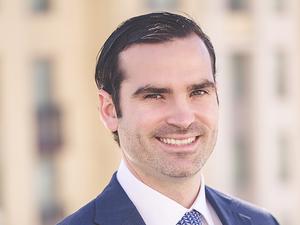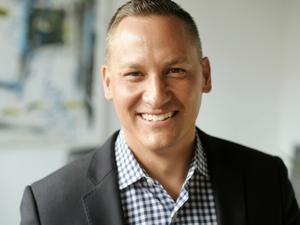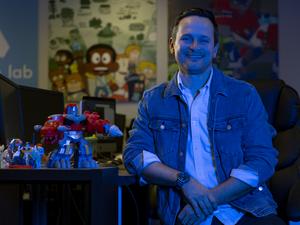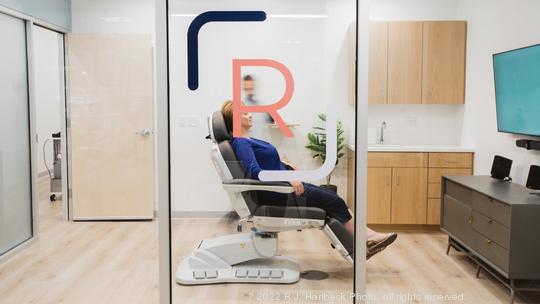
When co-founders Danish Nagda and Jeff Gamble in 2016 launched their startup Rezilient Health, they thought they were creating a medical device firm.
The pair began Rezilient with a focus on creating robotics that would help doctors digitally control medical devices remotely, with plans to provide the technology to physicians to perform exams, ultrasounds and procedures over the internet. Years later, while Rezilient has maintained its focus on technology and telehealth, it has evolved into a health care provider itself, offering concierge primary care to employers and individuals.
“The journey has been a surprise,” said Gamble, Rezilient’s chief technology officer.
Rezilient recently reached a key milestone in its evolution into a primary care provider, opening its first and flagship “CloudClinic” in downtown Clayton, at 7923 Forsyth Blvd. Describing its CloudClinics as a “hybrid approach” to telehealth, Rezilient has designed the facility to provide a physical location for patients to visit, but that uses technology allowing doctors to provide care remotely. Rezilient’s doctors use the startup’s cloud health technology to provide care, and the clinic is staffed by employees who can take a patient’s vitals and labs.
Rezilient says it structured its operations to allow its doctors to care for a patient portfolio that’s fewer than 1,000 individuals, below the industry average, allowing its CloudClinics to operate without waiting rooms and to offer easy access to same-day appointments, if needed. A 2016 study published in the Journal of the American Board of Family Medicine said it found that physicians’ panels of patients range from about 1,200 to 1,900 individuals. Nagda said the operating model also allows doctors to spend more time with patients, with the average appointment for first-time patients being around an hour.
"They have free time available because of our model. We take our time and we want to increase utilization of primary care. You're never rushed out of the room. Some of our appointments can go as long as an hour and a half," said Nagda, Rezilient's CEO.
Rezilient currently employs two doctors and a nurse practitioner. Its staff also includes CloudClinic specialists with nursing and EMT qualifications.
During a recent tour of Rezilient’s Clayton CloudClinic by St. Louis Inno, Nagda said he believes his company’s primary care exams offer patients a more “transparent” experience than traditional health care providers. He said that stems from Rezilient’s use of technology that allows patients to hear their heartbeat as they are examined and to see on a screen what the doctor sees as they check body parts, such as the patient's ear.
“Now the doctor can actually show you what they are doing,” Nagda said.
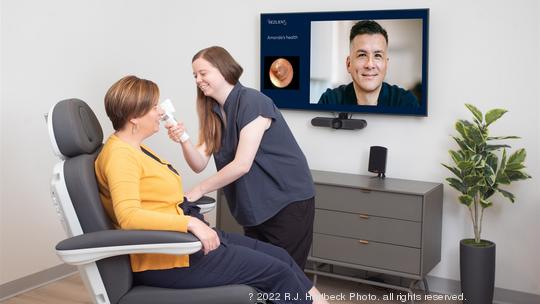
Rezilient’s Clayton clinic spans 1,525 square feet and includes three exam rooms. The startup says three employers have partnered with Rezilient to offer its concierge primary care to their employees. They include Technology Partners, Butler’s Pantry and a third employer the startup declined to name but said has more than 3,000 employees. Rezilient also offers its primary care to consumers who can sign up individually.
In August 2021, Rezilient announced it raised $2.5 million from investors to launch its remote health clinics. As it seeks to ink additional employer partnerships, Rezilient said it plans to open additional CloudClinics in St. Louis, Miami and Minnesota. It has tagged partnerships with employers with self-funded health insurance plans. The startup contends its concierge primary care practice can help reduce costs by minimizing more expensive claims such as emergency room visits, delivering preventive care and early detection of medical conditions that can provide a return on investment for employers.
“That’s what this really helps with,” Nagda said.
